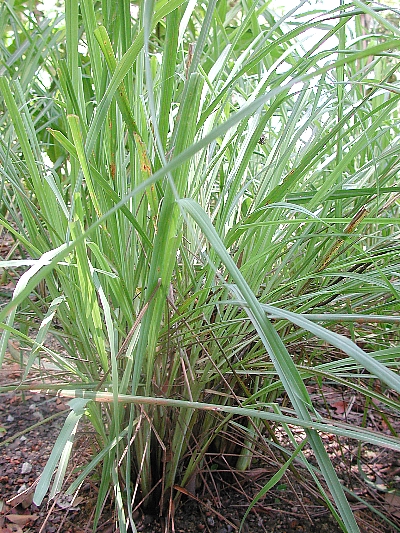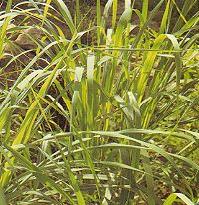|
Lemon Grass
(Cymbopogon citratus)
|
|
|

 PLANT IMAGES
PLANT IMAGES
|
Family: Poaceae
Genus: Lemon Grass
Species: Cymbopogon Citratus
Synonyms:
Common names: Scurvy grass, lemon grass, lemongrass, citronella grass, fever grass
Parts Used: Leaves, stems
| Lemon Grass |
| HERBAL PROPERTIES AND ACTIONS |
| Main Actions |
Other Actions |
Standard Dosage |
| cures colds |
abdominal cramps |
Seed and Leaves |
| helps digestive problems |
slows mucus secretions |
Leaf Decoction: 1 to 4 cup tea daily |
| fevers |
dries secretions/oils |
Oil: |
| headaches |
cleanses blood |
|
| kills germs |
stimulates digestion |
|
| insect repellent |
arthritis |
Poultice: place strained herb directly on infected areas |
| reduces phlegm |
ease pain |
|
A tall perenial grass assumed to have its origins in Malaysia. Widely used as a herb for cooking as well as for its medicinal values. It has a lemony flavor and scent (imagine that!), and it is used fresh, dried, and powdered,ansd distilled for the oil.
PLANT CHEMICALS
Chemical Composition.—There are about 55 species of
lemongrass but they differ little chemically, the chief constituent
being their volatile oil beta-myrcene, Citronellal, Geranyl Acetate, Nerol, Geraniol, Neral, Limonene and Citral
TRADITIONAL USES
Lemon grass tea is taken for fevers, coughs, colds and as a pleasant tonic or beverage. It promotes prespiration and excretion of phlegm, eases stomach cramps, and is especially useful for children and infants. For adult fevers, 1 mashed root and 10 leaves are boiled in 3 cups of water for 10 minutes, the patient is given this to drink while it is still very hot, then is wrapped up warmly and put to bed. For childhood fevers, 10 leaves are boiled in 3 cups of water for 10 minutes; 1/2 cup of this is given to the child 6 times daily and the child is kept warm throughout. Mashed root is soaked in oil and rubbed on the body to relieve backache and muscle spasms, and over the forehead to releive headaches.
CURRENT PRACTICAL USES
Lemon grass acts as an antifungal and antibacterial along with its many other properties. Used internally or externally it has been proven to accomplish many things. It also has the ability to cut grease and can be used on oily skin or as a degreaser. —Stimulant,
diuretic, tonic, aromatic, antispasmodic and a mild counter-irritant; also reputed
to increasing secretion and discharge of urine.
The grass is stimulant, diuretic, tonic, aromatic, antispasmodic and a mild counter-irritant. It increases secretion and discharge of urine. Oil distilled from its leaves is used for medicinal purposes. It promotes good digestion, reduces phlem and a preparation of lemon grass with pepper has been used for relief of menstrual troubles and nausea. It can be used as a degreaser therefore it helps on oily skin. It induces perspiration, to cool the body and reduce a fever. Relieves spasms, muscle cramps, rheumatism and headaches.
Specific indications and Uses.
- Insecticidal: Lemongrass is quite popular as an insect repellant due to its natural properties. It kills insects and also keeps them away (but I am not sure yet whether it repels tabano's!).
- Analgesic: Reduces pain and inflammation in muscles, joints, toothache and headache resulting from viral infections like cough & cold, influenza, fever, pox etc.
- Anti Microbial and Anti Bacterial: Inhibits microbial and bacterial growth in the body, internally or externally. It is seen to be effective in inhibiting bacterial infections in colon, stomach, urinary tracts, wounds, respiratory system etc. and helps cure diseases resulting from bacterial or microbial infections such as typhoid, food poisoning, skin diseases, body odor, malaria (caused due to protozoon) etc.
- Anti Pyretic: That is an agent that brings down very high fever, quite similar to febrifuge but is effective on very high fever too. It is often given with tea for this purpose.
- AntiSeptic: The antiseptic properties make it a good application for external and internal wounds as well as an ingredient of the antiseptic lotions and creams..
- Astringent: An astringent speeds up clotting of blood.
- Carminative: It does not only help remove gas from intestine, but also stops further gas formation.
- Deodorant: Herbally become lemon fresh!
- Diuretic: Increases urination, both in frequency and in quantity which helps clean kidneys.
- Febrifuge: Helps bring down fever by fighting the infections due to which the fever is caused as well as by increasing perspiration.
- Fungicidal: Lemongrass has good fungicidal properties and may be used to cure fungal infections, both external and internal.
- Galactogogue: Galactogogue is a substance or an agent that increases formation of milk in the breasts as well as enhances the quality of milk. This property is very helpful for the lactating mothers and the babies. Apart from increasing milk, it also helps babies in another way. Babies are prone to infections. The anti microbial and anti bacterial properties of Lemongrass oil are also absorbed in the milk and thus indirectly help the baby get rid of such infections.
- Nervine: Acts as a tonic for the nerves and the nervous system. It helps cure many nervous disorders such as shaking hands or limbs, nervousness, vertigo, Alzheimer’s disease, Parkinson’s disease and convulsions, sluggishness, lack of reflexes etc.
- Sedative: This is perhaps one of the most important and most appreciated medicinal properties of Lemongrass Oil. It is an excellent sedative. It has a great soothing, sedating and calming effects on mind, cures inflammations, itching of skin and relieves tension and anxiety. This feature can help patients of insomnia too.
- Tonic: An agent which tones up and boosts health is a tonic. Lemongrass Oil is a tonic in real sense. It tones all the systems functioning in the body, such as respiratory system, digestive system, nervous system and excretory system and facilitates absorption of nutrients in the body, thus providing strength and strengthening immune system.
- Other Benefits: Helps cure cellulite, fungal infections and digestive problems and reduces excessive perspiration too.
—Lemon grass and its oil are carminative, valuable in relieving flatulence. It is given in doses of 3 to 6 drops with sugar as an emulsion. The emulsion is prepared by mixing 3 to 6 drops of common lemon grass oil with sugar.
Digestive Disorders: Lemon grass is useful in strengthening the functions of stomach and promoting its action. It is beneficial in the treatment of indigestion. Lemon grass oil also treats spasmodic affections of the bowels, gastric irritability and cholera.
Fevers; The grass induces copious perspiration and brings down temperature. It also produces a feeling of coolness. Raw juice or decoction of the grass can also be taken.
Menstrual Disorders; An infusion of the grass, mixed with black pepper, is given in painful and difficult menstruation. Raw juice or decoction of the grass may be taken in such a condition. Researchers have found that Lemongrass does hold antidepressant, anti-oxidant, astringent, bactericidal, fingucidel, nervine and sedative properties. It also can be used as a deodorant and body tonic.
Rheumatism and Other joint Pains
The grass is used locally over rheumatic joints, lumbago and sprains. Lemon grass oil mixed with twice its bulk of coconut oil is a stimulating ointment for rheumatism, lumbago, neuralgia, sprains and other painful affections. In chronic cases, the undiluted oil may be used for better results. It can also be taken internally in the same manner as for fevers.
Ringworm Leaves of lemon grass are useful in treating ringworm as a local application. A paste of the leaves made with buttermilk should be applied on the affected part.
|
|